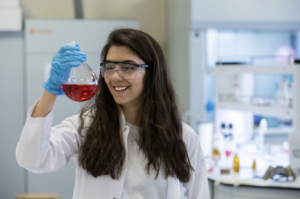Chemistry IA – Guide on how to get a top grade

To get the very top marks in your IB Chemistry IA (Internal Assessment), you need to show initiative, curiosity, and independent thinking. This article guides you through how to do it.
Easy to say, I can hear you groan!
Followed quickly by the question: “OK, but how do I make this happen to MY Chemistry IA?”
Today, we share the key elements you need to get as close as possible to the maximum Chemistry IA score of 24. This will give you the confidence to do your best in this important part of the IB Chemistry assessment.
Believe me when I say put in the time, and you can use these tips to get the best IA score possible.
Plus, if you still feel adrift, we have a team of IB teachers and experienced IA Examiners who offer tuition and can quickly show you the way.
A quick re-cap – What does the Chemistry IA involve?
Overall, your Chemistry IA should be a 6-12 page lab report, (no longer or you’ll be marked down) describing the design, findings, and evaluation of your investigation.
True, it will be the most important lab work you have ever done, but by taking it step by step, and getting help where you need it, you’ll do a great job.
Have faith!
It is a mini-research project, and worth 20% of your final Chemistry IB mark.
So, it is worth getting started in good time. If you are reading this because you are procrastinating, this is the moment to jump in and get started.
Remember, the first step is always the hardest. soon, you’ll be on your way to creating a great research paper.
It will be set out in the following way:
Investigation title – This identifies the topic.
Research question – Here you state your research question clearly and concisely.
Introduction – This is where you set the context for your research, including a brief summary of what is already known about your area of investigation. – Often this is too general in nature. Instead, it needs to address the specifics of the research question or the methodology.
Prediction – Prediction of the outcome of your investigation.
Method – Summarising your procedure, and requires a lot of detail.
Analysis – Recording all qualitative and quantitative data you gathered. Plus, the processing that you have used to gather your conclusions.
Evaluation – Assessing the extent to which you have evaluated your research question, identifying weaknesses and suggesting improvements.
Bibliography – Using the correct format for your citation
But now, let’s do a deep dive into what it takes to get the best marks.
Select a laser-focused Chemistry IA question for good data collection
- You need to set the scientific context for the research question.
- It needs to state the aim and context of your investigation.
- You can phrase it as a statement or a question and it can also be in several parts. As long as each bit of the question is clearly defined and focused on one aim
- To test if it is clear, let someone not familiar with your work see if they understand what you are investigating and what you are doing experimentally. The research question should not simply be a restatement of your project title.
- Plus, it has to be linked to one of the SL or HL topics.
- It also needs to be complex enough to allow you to demonstrate high-level thinking, sufficient for a top grade.
- Above all, the research question needs to lead to the collection of good data.
Fail to prepare is to prepare to fail
- You may have heard this a million times before, but it is more true of the Chemistry IA than any other part of the Chemistry IB Diploma. In fact, as an IB Examiner, I can say that your Chemistry IA needs more planning than ANY of your other IAs.
- I’ve known many students who have had to completely redo their experiments in a last-minute rush because of mistakes in planning.
- To get a top Chemistry IA grade you must plan. In fact, winging it here could lead to failure. So, make sure you have time factored in to re-do the experiment if you run into problems.
Presentation and layout of your Chemistry IA must be clear and logical
- Present the information in a clear way.
- Importantly this means writing your IA using headings and subheadings where appropriate.
- Above all write clearly and concisely, and use the correct scientific terminology and the most recent Chemistry conventions. For example, iron(II) sulphate instead of ferrous sulphate.
Choose a Chemistry IA topic you are passionate about
- The best advice here is to choose a topic of significant personal interest. By chosing a subject you love (ok, even like), it is going to make the end result more engaging, interesting, and in the end get a higher score.
- Use your initiative to identify and solve the problems related to designing, collecting, and processing the data.
- This means avoiding one that your teacher has seen a million times before.
- It needs to be different from your peers as each student needs to have their own research question. Claim yours early!
- Introduce your topic of investigation by citing facts/ statistics that demonstrate the significance of the chosen DV in a real-world context.
- Don’t forget to cite the choice of sources for the background.
- You must explain the link between the chosen variables and cite academic literature to provide reliable support for each factual claim.
Book free trial with our certified IB Chemistry teachers today
100 % of tutors are certified teachers and examiners
Be creative in designing your methodology
- The design of the method is important. In fact, IB Chemistry teachers get tired of seeing the same examples found on the internet. Instead, show original thinking and test and modify the methodology accordingly.
- Often students aren’t clear enough when reporting capacities for volume measuring instruments or use imprecise glassware like beakers and measuring cylinders, when they should be using equipment like volumetric flasks and graduated pipettes.
- Remember to include information about calibrating instruments if you are using them.
- When thinking about the choice of materials, including only reasonable amounts (remember the green chemistry approach is important).
- Take care when writing the risk assessment. This means taking steps to minimise the risk of harm. Not only to yourself as the researcher, but also to the environment (where appropriate).
- Where harm is possible, you must outline the procedures for seeking medical attention. Please go beyond the very basics of safety goggles and gloves.
- Don’t forget to describe the steps for obtaining human consent where appropriate.
- Comment on the way you will safely dispose of the substances.
Tips on taking care with data collection
- The description of the collection of data must be clear and logical, making reference to the required equipment. Above all include diagrams for the setup if it helps the reader to understand.
- Include the choice of methods for the analysis of the data, this could include:
- propagation of errors, and statistical methods, error bars on graphs, well constructed best fit lines, maximum or minimum slopes, appropriate consideration of outlier data, consideration of equation of a line and the R2 value, consistent significant figures and decimal places, sensible protocol on the propagation of errors through numerical calculations, comparison of data from different data sources (secondary data examples) to evaluate variance, evidence of investigation of research into the uncertainties associated with database data.
How to interpret your IA Chemistry results
- Make sure that you have interpreted the data in direct relation to your research question.
- Ensure you comment on the extent to which the data supports your hypothesis.
- Comparison of the results to published data and provide a scientifically supported explanation for any similarities and differences.
- Identify the strengths and weaknesses (systematic and random errors) of the experiment by commenting on the suitability of the range of tested values; the precision of the measurements; the control of variables and the impact they may have had on the experiment and how much the data differs from previously published data.
- Moreover, provide suggestions as to how to improve the experiment. Particularly in relation to each of the weaknesses identified and discuss the implications of making modifications.
- Above all to reach the top grades you must show how to extend the investigation in a meaningful way. Particularly you must describe how this information will enhance the knowledge relating to the studied topic.
- Finally, it is essential to set up the scientific context for the conclusion.

Proofreading – Don’t waste valuable feedback
- As your teacher is limited in the feedback they can give you, make sure that you have got rid of as many errors as possible in your writing yourself. This means proofreading it carefully before you hand it in.
- Also, read it with through the eyes of your teacher, what would they pick up on? Try to get rid of as many basic mistakes as possible before you had it in.
- You can also try evaluating yourself using the mark scheme, then work on your draft to improve it ahead of your teacher’s feedback.
- If you have kept thorough, clear notes
Although your teacher will grade your IA, a number of the IAs will be sent off for external grading. Then your teacher’s grades for the class will be adjusted up or down accordingly.
Finally, if you still feel lost or overwhelmed we are here to help.
Find out more about IB assessment here.
View all our tutors here
Check out our dedicated page for IB Chemistry
For more information on IB HL Chemistry take a look at the HL subject guide, and for SL Chemistry and the course in general, please take a look at the IB SL Chemistry subject guide.















